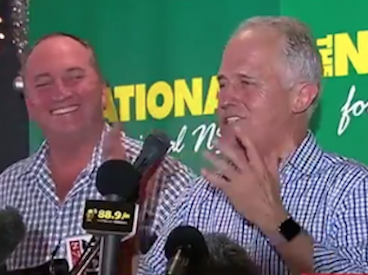The High Court judgement to declare Barnaby Joyce ineligible to sit in Parliament was entirely predictable — so why did he hang around until Friday? Ingrid Matthews reports.
As chance would have it, Barnaby had already left the Parliament. Who would have thought that when the High Court of Australia handed down its decision on his (in)capability to be chosen or to sit in the Australian Parliament (see s44 of the Australian Constitution), Barnaby would be busy campaigning in the seat of New England?
Joyce was first off the mark after their Honours found he failed to comply with the founding document of the nation. The now-not Deputy Prime Minister rattled off a list of bridges and by-passes and what-not in Uralla and Weabonga and Walcha and Bendemeer: meeting place, swamp oak, rising sun and river bend respectively. But never mind about actual places their people, and their meanings.
The Joyce presser was a campaign launch — and launching a by-election campaign off the back of a High Court decision is obviously a principled action of the first order.
There he was, Mr Barnaby Joyce, non-MP, non-DPM, non-acting-Minister for Resources (unlike non-disqualified Nationals Senator Matthew Canavan), non-Minister for Water Resources, non-Minister for Agriculture, non-Minister for Northern Australia, non-acting Prime Minister, probably still-leader (because still member) of the National Party. He held seven high-ranking positions. Seven. We pay over $400,000 per year in salary and almost the same again in expenditure for Joyce’s unqualified services.
The nervous defiance, the trademark verisimilitude, the usual vermillion loquacity was all there. Some might say that Barnaby Joyce, who cut his teeth in that bastion of propriety the Queensland Nationals, somewhat lacked respect and contrition, and remorse. These are qualities routinely demanded of offenders awaiting sentence, of parties to matters in which they have been found in breach of the relevant laws before the relevant court.
But no more than lip-service to contrition is asked of the DPM-who-never-was, the million dollar man who is, literally, at law, not qualified to hold seven highly-paid government positions, and never mind that the relevant law is the Commonwealth of Australian Constitution and the relevant court is the High Court of Australia (Re Joyce (HCA judgements here).
Joyce says, "in my gut, I thought this was the way it was going to go". So why did he stay in cabinet? https://t.co/HjrYFbkvwv via @smh
— Stephanie Peatling (@srpeatling) October 27, 2017
It is one thing to express opprobrium at the dismal political inadequacy of Barnaby Joyce. It is quite another for the High Court to find him ineligible from holding his political positions in the first place. Yes, it is complex – lawyers and politicians (often the same thing) and their gatekeepers choose to make it that way – but it is not that complex.
I am only looking at Re Joyce here, because there are too many variables for one column and Joyce is the one disqualified from the House of Representatives, rather than the Senate. He is the one swanning around purporting to be Deputy Prime Minister – including purporting to be acting Prime Minister – when under Australian law he was never capable, eligible, or qualified to do so.
Variables: Here are a few
There are seven High Court judges. Seven politicians stood before them. The High Court can hand down 7-0 decisions, or 6-1 or 5-2 or 4-3 decisions. There were submissions on three forms of citizenship: birth, descent and naturalisation. There were politicians who were born in Australia to one or both parents born in Australia, or to one or both parents born overseas. Or born overseas to Australian-born parents or born overseas to overseas-born parents. There were politicians whose parents were naturalised Australians who had renounced their birth-country citizenship and whose naturalised parents had not renounced.
Is that 149 possible outcomes already?
It is worth noting that Kiefel CJ is the first ever woman Chief Justice in this country. The bench heard an unprecedentedly charged political decision. Inside a fortnight, the High Court handed down a 7-0 judgement on seven politicians represented by very expensive counsel, who made extremely detailed submissions, on the most prestigious area of law – constitutional law – because it is the founding law of the nation state.
In law, this is literally called case management. It is curial efficiency in its proper form and meaning. It is logical and clean, intellectually rigorous and, in this case, constitutionally consistent.
The approach to construction urged by the amicus and on behalf of Mr Windsor gives s 44(i) its textual meaning, subject only to the implicit qualification in s 44(i) that the foreign law conferring foreign citizenship must be consistent with the constitutional imperative underlying that provision, namely, that an Australian citizen not be prevented by foreign law from participation in representative government where it can be demonstrated that the person has taken all steps that are reasonably required by the foreign law to renounce his or her foreign citizenship.
The High Court has booted five politicians out of Federal Parliament for being dual-citizens. #7News pic.twitter.com/l8WnkHA14d
— 7 News Melbourne (@7NewsMelbourne) October 27, 2017
Some lawyers will see this as "constitutionalism" as opposed to an "interpretivist" approach. The layman/media equivalent terms are "technicalities" and "judicial activism". Both are wrong. What the High Court had to navigate, and it is no small intellectual effort, was the proper meaning – what judges call the "true construction" – of s44(i), but without (a) re-writing the provision, or (b) giving effect to foreign laws.
The key party regarding foreign laws was Canavan: he became 'entitled to the rights or privileges of a subject or a citizen of a foreign power' under s44 by operation of an Italian constitutional court decision.
The High Court said (at [19]):
The approach urged by the amicus and on behalf of Mr Windsor must be accepted. It adheres most closely to the ordinary and natural meaning of the language of s 44(i). It also accords with the views of a majority of the Justices in Sykes v Cleary, the authority of which was accepted by all parties. A consideration of the drafting history of s 44(i) does not warrant a different conclusion. Further, that approach avoids the uncertainty and instability that attend the competing approaches.
What does it all mean?
This paragraph is everything. It adheres to the Constitution and to the case law, which requires nominees to take "reasonable steps" to ensure they are only Australian citizens. It dismisses the mountain of factual claims with which the Commonwealth, by way of case strategy, one can only assume, tried to bury the High Court in detail. It also distinguishes Canavan from Joyce, because the Canavan connection to Italy was an accident of history.
In contrast, the Joyce connection to New Zealand was predictable and known or knowable: he could have checked and taken reasonable steps to renounce, as he did in August 2017, but he had not and he did not in 2004 (in Queensland) or in 2013 (in New England).
Amazed at suggestions we should allow foreign nationals to serve in the Australian Parliament because two Green MPs can't manage basic admin
— James Paterson (@SenPaterson) July 18, 2017
Ultimately, the accusation of sloppiness that Turnbull and Joyce levelled at Greens senators Scott Ludlum and Larissa Waters, in fact, characterises the blasé approach to high office of Joyce himself and, by extension, of his boss. And do not make the mistake of thinking for a moment that either of these men have learnt a thing. As I write, Turnbull and Joyce are spruiking the Joyce credentials for the seven positions he illegitimately held — at a cost of millions of our dollars.
In a final twist that would be irony if not so ludicrous and insulting to our collective intelligence, Malcolm Turnbull has appointed himself Acting Minister for Agriculture and Water.
Ingrid Matthews is a sessional academic who teaches law and human rights. You can follow Ingrid on Twitter at @iMusing or via her blog oecomuse.

This work is licensed under a Creative Commons Attribution-NonCommercial-NoDerivs 3.0 Australia License
Monthly Donation
Single Donation
Oh dear, @TurnbullMalcolm!!! They didn't so hold after all!!! RT @JasonClareMP: Judgement. pic.twitter.com/L8291YKyrB #HighCourt
— Freedom Cyclist (@FreedomCycliste) October 27, 2017
Subscribe to IA. It's independently Australian.











